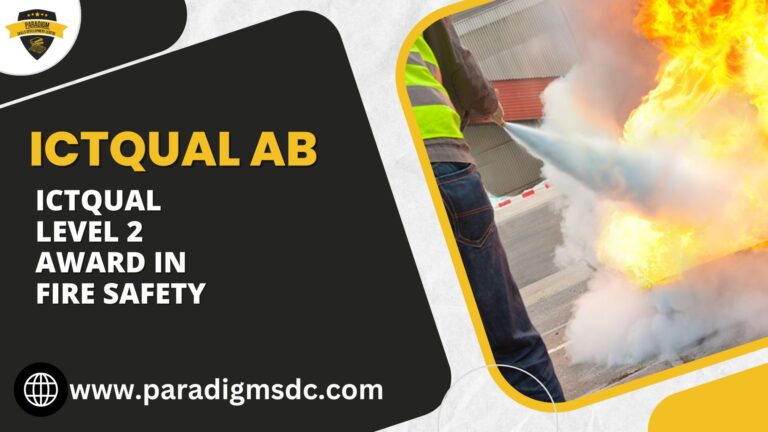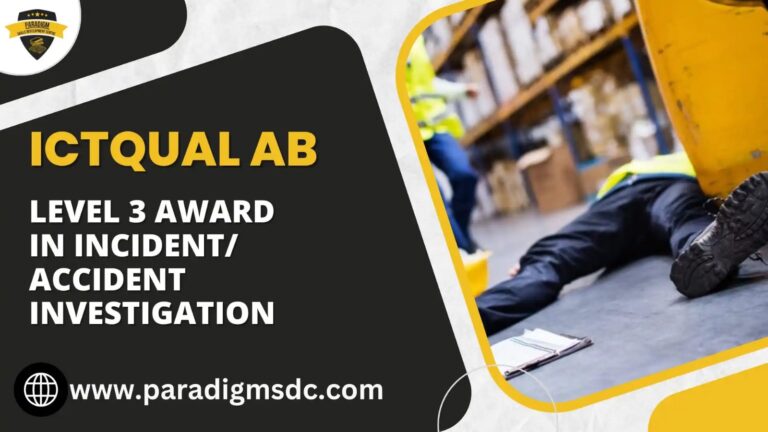Course Introduction
The ICTQual Level 3 Award in Emergency Rescue is designed to equip individuals with the essential skills and knowledge needed to effectively respond to emergency situations. This course is ideal for those looking to pursue a career in emergency services or enhance their existing skills in emergency response.
Course Overview
The course focuses on practical training and theoretical knowledge required for emergency rescue operations. Participants will learn about various rescue techniques, safety protocols, and emergency management procedures. The curriculum emphasizes hands-on training to ensure readiness in real-life scenarios.
Course Study Units
- Introduction to Emergency Rescue Operations
- First Aid and Medical Response
- Search and Rescue Techniques
- Fire Safety and Suppression
- Emergency Communication and Coordination
- Risk Assessment and Management
- Psychological First Aid
- Ethical and Legal Considerations
Learning Outcomes
By the end of the course, participants are expected to:
Introduction to Emergency Rescue Operations
- Understanding of Emergency Response Principles: Participants will grasp the fundamental principles of emergency response, including the importance of rapid assessment, effective communication, and coordinated action.
- Awareness of Roles and Responsibilities: Learners will recognize the roles and responsibilities of emergency responders, both individually and as part of a team, in managing various types of emergencies.
- Competency in Incident Management: Participants will develop the skills necessary to manage emergency incidents effectively, including prioritizing tasks, allocating resources, and adapting to changing circumstances.
First Aid and Medical Response
- Proficiency in Basic Life Support Techniques: Participants will acquire the skills needed to perform basic life support procedures, including CPR, airway management, and control of bleeding.
- Capability in Wound Management: Learners will demonstrate competence in assessing and treating different types of wounds, including cuts, burns, fractures, and sprains.
- Knowledge of Emergency Medical Procedures: Participants will understand how to assess and stabilize patients in emergency medical situations, including identifying signs of shock, administering medication, and providing comfort care.
Search and Rescue Techniques
- Understanding of Search and Rescue Methods: Learners will be familiar with various search and rescue techniques, including grid searches, line searches, and area searches, and understand when to apply each method based on the situation.
- Proficiency in Navigation and Orientation: Participants will develop skills in map reading, navigation, and orienteering to locate and extract individuals in different environments, such as urban areas, wilderness settings, and water bodies.
- Competency in Victim Extraction: Learners will demonstrate the ability to safely extract individuals from hazardous situations, including using specialized equipment and techniques for extrication.
Fire Safety and Suppression
- Knowledge of Fire Dynamics: Participants will understand the principles of fire behavior, including how fires spread, the factors that influence fire development, and methods for controlling fire growth.
- Skills in Fire Suppression Techniques: Learners will acquire practical skills in using firefighting equipment, such as fire extinguishers, hoses, and hydrants, to suppress fires and protect lives and property.
- Awareness of Evacuation Procedures: Participants will be familiar with evacuation procedures and protocols for safely evacuating individuals from buildings and other structures during fire emergencies.
Emergency Communication and Coordination
- Proficiency in Communication Protocols: Learners will understand communication protocols and procedures for coordinating with emergency services, other responders, and individuals in distress during rescue operations.
- Capability in Radio Procedures: Participants will develop skills in using radio communication devices and following established radio procedures to convey critical information accurately and efficiently.
- Effective Team Coordination: Participants will demonstrate the ability to work collaboratively as part of a team, including sharing information, making decisions, and coordinating actions to achieve common objectives.
Risk Assessment and Management
- Ability to Identify Hazards: Participants will learn to identify potential hazards and assess risks in emergencies, including natural disasters, hazardous materials incidents, and structural collapses.
- Skills in Risk Evaluation: Learners will develop the ability to evaluate risks systematically, considering factors such as severity, likelihood, and potential consequences, to inform decision-making and resource allocation.
- Competency in Risk Mitigation: Participants will understand strategies for mitigating risks and reducing the likelihood of harm to responders and individuals in distress, including implementing control measures and protective actions.
Psychological First Aid
- Understanding of Trauma Response: Participants will learn about the psychological and emotional impact of emergencies on individuals and communities, including common reactions to trauma and stress.
- Skills in Providing Emotional Support: Learners will develop skills in providing emotional support and practical assistance to individuals affected by trauma, including active listening, empathy, and reassurance.
- Awareness of Self-Care Practices: Participants will recognize the importance of self-care for emergency responders, including strategies for managing stress, maintaining resilience, and seeking support when needed.
Ethical and Legal Considerations
- Knowledge of Ethical Principles: Participants will understand the ethical principles and values that guide emergency response activities, including integrity, accountability, and respect for human dignity and rights.
- Awareness of Legal Obligations: Learners will be familiar with relevant laws, regulations, and standards governing emergency rescue operations, including duty of care, confidentiality, and liability issues.
- Competency in Decision-Making: Participants will develop the ability to make ethical and legally sound decisions in complex and challenging situations, balancing the needs of individuals, organizations, and communities.
Course Benefits
- Enhanced Skill Set: Gain practical skills and theoretical knowledge crucial for effective emergency response.
- Career Advancement: Improve career prospects in emergency services, rescue teams, and related fields.
- Increased Confidence: Develop confidence in handling emergency situations and providing aid to those in need.
- Professional Recognition: Obtain a recognized qualification demonstrating competency in emergency rescue operations.
Who is This Course For?
This course is suitable for:
- Individuals aspiring to work in emergency services, including firefighters, paramedics, and rescue personnel.
- Existing emergency responders looking to enhance their skills and qualifications.
- Safety officers, industrial workers, and anyone responsible for emergency preparedness in their workplace.
Future Progression for This Course
Successful completion of the ICTQual Level 3 Award in Emergency Rescue can lead to:
- Advanced Training: Progress to higher-level emergency rescue qualifications or specialized rescue courses.
- Career Development: Pursue leadership roles within emergency response teams.
- Further Education: Use credits from this course towards higher education qualifications in emergency management or related fields.
In conclusion, the ICTQual Level 3 Award in Emergency Rescue is a vital qualification for individuals serious about emergency response careers. It combines practical training with theoretical knowledge to ensure participants are well-prepared to handle challenging situations effectively. Whether you’re starting in the field or advancing your career, this course equips you with the skills and confidence needed to make a difference in emergency situations.







